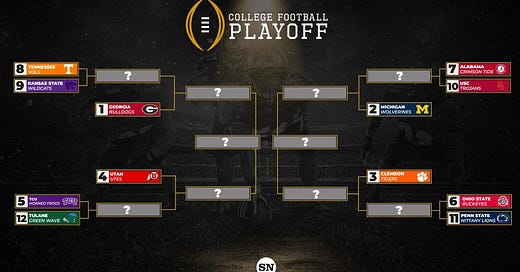Revisiting the College Football Playoff
Back in 2021, I called the College Football Playoff a failure, and since then it has only gotten worse: more blowouts, more rematches of games we’ve already seen, more SEC dominance while teams from non-Power Five conferences get excluded. This year’s playoff featured a minor milestone, as the first ever with neither Clemson nor Alabama — but Ohio State is back after a one-year absence. As I wrote last time, those three teams have made up ~60% of the total appearances since the playoff was first instituted in 2014.
But it’s time to rejoice! A few weeks ago, it was announced that, starting with the 2024 season, the playoff will expand from 4 to 12 teams. Surely this will fix the problems, right?
Well, color me skeptical. When I wrote about this two years ago, I attributed the CFP’s failure to incrementalism: Despite all the tweaks made to college football’s postseason in the last 30 years — from the Bowl Coalition to the Bowl Alliance to the Bowl Championship Series to the playoff — nobody has ever addressed the core issue. That is, all these systems have been unfairly biased towards major conferences and big programs because those teams make more money. The bowls and the TV networks and so many stakeholders all benefit from this unfairness, so it never goes away.
Whenever a ridiculous system persists despite everyone acknowledging that it is bad — whether it is the American healthcare system or the college football bowl system — the people who benefit from the system being bad insist that we better not do anything too crazy like trying to actually fix it. Any radical change might be even worse, so instead we get tweaks around the edges that do not address the problems. Because, again: Some people benefit from those problems.
But today I want to use the expansion to talk about merit and forgiveness under capitalism.
If the new playoff rules were in place this year, the only non-major conference team to get a bid would be Tulane. Most of the added spots would go to familiar faces like Alabama, Clemson, Tennessee, and Southern Cal. This has been one of the more annoying features of the CFP: It gives second chances, but only to the most famous teams.
Whatever you want to say about the BCS — and people mostly HATED the BCS — you at least had to have a pretty great season to make the National Championship Game. Of the 32 teams that played in the BCS title game from 1998 through 2013, 28 won their conference championship. Three of the other four were undefeated in the regular season. Most teams entered the game undefeated; the 32 teams combined for 13 total losses prior to the championship game.
But in part because the BCS demanded so much of teams, it was seen as unfair: No non-major conference ever made the BCS championship game. How could any team outside the major conferences have a regular season that was better than an undefeated major program? That was, at least in part, the motivation for expanding the playoff, first to four and now to twelve teams.
This is not uncommon. Often, in the United States, people will recognize an unfair system, and respond by making it slightly less demanding, in the hopes that will ease the unfairness. One example of this in recent years has been college admissions, where more and more schools have gone “test optional” in recent years. Now, personally, I think that’s good because I think those tests are a waste of everyone’s time. But that’s not why schools do it — they do it because they hope eliminating the tests will promote diversity.
In other words, people have noticed that the college admissions process is unfair, and they have responded by making it a little easier. Except that most of the evidence suggests that dropping testing requirements doesn’t really work to increase diversity, since the same unfairness that pervades standardized testing also pervades other methods of selection. If you open the door a little wider, you don’t actually make the system more fair — you just make it easier for the people closest to the door to get in.
The major college football programs know this. College football opened the door, ostensibly to make it easier for outsider programs, and instead Alabama and Clemson and Ohio State walked in again and again. Sometimes they more or less limped in.
The lesson is that if you want to make something less unfair, you can’t just make it easier — you actually have to make it more fair. That might be more disruptive, because some people benefit from the unfairness. But sometimes it’s worth upsetting some people to do the right thing.



